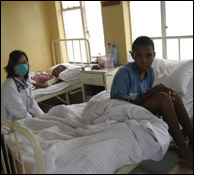May Nguyen, MD
Lesotho: February 2010

Before my elective in Lesotho, I spoke to others who had been. I understood that Lesotho is one of the poorest African nations, has one of the highest
rates of HIV and TB in the world, and that the average healthy life expectancy is in the early 40s. I understood that the country has one of the smallest
doctor to population ratios in the world. I understood that I would be working in a resource-poor setting and that I would have to depend primarily on
history-taking and physical exam skills to diagnose and treat patients. I understood these things; yet, nothing really quite prepared me to see these
things in person.
I was most frustrated by my limited ability to help. Outpatient medicine was almost completely different compared to back home - there were no
appointments, no continuity, and little preventive care. Patients in the outpatient department (OPD) were seen on a first come, first served basis. I was
slower than the local doctors because I was accustomed to obtaining detailed histories, performing exams, counseling patients, and documenting everything.
Medical records were kept by the patient and notes were written in English. Based on the brief documentation, it seemed that doctors did not spend much
time counseling patients or focusing on preventive care. How could they when there was a steady stream of patients waiting to be seen outside the door? In
some ways, the limited resources was a refreshing change because I could really focus on evidence-based medicine advising patients on exercise, sleep
hygiene, and building supportive relationships, in addition to prescribing the generic medicines that were most effective in controlling blood pressure and
blood sugar.
Additionally, I had to tolerate an amount of uncertainty because I was diagnosing and treating disease based on limited information. Obtaining a detailed
history could be challenging and it was so important in this setting because it was all I had with which to work. There were cultural constraints such as
notions of duration or how most of the Basotho wore layers including wool blankets in the 85 degree summer heat and everyone endorsed having fever, chills,
and night sweats. Before ordering labs, I had to consider what reagents the lab had in stock. Before prescribing medicines in OPD, I had to consult the
list of what antibiotics were currently stocked in the pharmacy that week. The x-ray machine was down for three weeks. Another week, an anesthesia machine
was not working so no surgeries could be performed. I had to focus on the history and treat everything empirically.
Despite these concerns, I had an amazing experience. Thank you to the Benjamin H. Josephson Fund for supporting my trip.